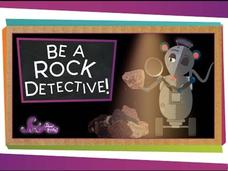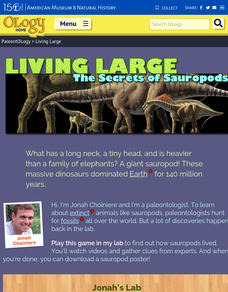Curated OER
How Do You Find the Volume of a Triangular Prism?
Do you need to find the area of a prism? Watch this video to find out how! An instructor goes through each step, recording her work on a whiteboard for reference. A solid instructional video that could be used at home or in the classroom.
Curated OER
How Do You Write a Rule for a Geometric Sequence?
Learners can review how to write a rule for the geometric sequence 2, 4, 8, 16. The tutor explains through direct instruction how they can use the rule to find the 6th, 9th, and 15th terms. This clip is best suited for individuals who...
Bozeman Science
Genetics
An informative video begins with 14 vocabulary words related to genetics, allowing scholars to think about their definitions before the instructor reviews a few tricky definitions. Individuals then learn about Gregor Mendel's...
Teach Engineering
How Antibiotics Work
Take two pills and call me in the morning. The first lesson in a short unit of four introduces class members to delivery methods of medicines. The instruction introduces the question of which delivery method is best to get you feeling...
SciShow Kids
What Is the Milky Way?
The Milky Way is the focus of an engaging video that details the galaxy in which we live, equipped with an energetic host, a cartoon sidekick, and eye-catching graphics.
SciShow
What Are Eye Boogers?
Human eyes have a tear film that covers them and helps clear away the dust that would otherwise impede your vision. The video explains what happens when the eyelid doesn't open and close enough to clear away the dust, like when you are...
SciShow Kids
Be a Rock Detective!
Every kid has a rock collection! That's because rocks are unique and different. Learners discover how igneous, metamorphic, and sedimentary rocks form in an informational and visually engaging video.
Macat
An Introduction to Hannah Arendt’s The Human Condition
Do you live a life of action or a life of contemplation? Hannah Arendt's 1958 publication The Human Condition addresses the philosophical components of human life, including the necessity of and relationships between work,...
Veritasium
Galileo the Scientific Parrot
Not all falling objects accelerate at the same rate ... unless you remove air resistance. A video lesson compares a feather falling in the air to one falling in a vacuum. Removing air resistance causes a feather and coin to fall at the...
Deep Look
From Drifter to Dynamo: The Story of Plankton
Even the smallest living things have a large impact. An informative video lesson presents an introduction to types of plankton and their roles in the ocean. The narrator explains how plankton impacts the ocean ecosystem and beyond.
Be Smart
How Do Glaciers Move?
A glacier is like a river of ice. An interesting lesson explores how solid glaciers manage to flow. The video instructor explains how the pressure of the weight of the ice decreases the melting point, allowing the glacier to move.
PBS
The Story of Saberteeth
Smilodon's fangs averaged 18 cm long. An engaging video explains what saberteeth are and how they evolved. It details the theories about how species used saberteeth and why cats don't have them today.
SciShow
A New, Bubbly Origin Story for the Solar System
The truth is, we still don't know the origin story of our solar system. Each theory has supporting and competing evidence, making it difficult for people to accept just one. The installment of a solar system series discusses a new...
Periodic Videos
Silver
To prevent smelly feet, silver nano-particles find their antibacterial properties used in socks. Learn about the history and properties of silver in only a few minutes. Viewers of an installment in a chemistry series observe chemical...
Mathispower4u
Raising Fractions to Powers (Example)
Many people get confused when we combine rules previously used individually. Learn how to combine the fractions rules with exponents, multiplying exponents by exponents, and variables in only a few minutes. Three example problems...
Mathispower4u
Solving Multiple Step Equations Involving Decimals
As if solving multi-step equations isn't challenging enough, now they have decimals! The video lesson explains strategies for working with these decimals while solving. Learners watch as the video instructor explains how to solve two...
Corbett Maths
X Equals Graphs
Y equals graphs are horizontal, but x equals graphs are vertical. Learners explore the connection between the graph and the equation of vertical lines while watching an instructional video. The presenter shows a set of ordered pairs...
California Academy of Science
How to Measure a Changing Climate
Young scientists explore climate change by taking a look at many different disciplines. They hear from scientists who study soil, clouds, ice cores, ocean temperatures, and more. Then, they search public databases to draw their own...
Crash Course
Ford, Cars, and a New Revolution: Crash Course History of Science #28
The Industrial Revolution led to technological inventions we still use today. A video presentation explains the important inventions of the Industrial Revolution. Instruction includes a thorough discussion of the advancement of the...
Crash Course
Marie Curie and Spooky Rays: Crash Course History of Science #31
Marie Curie overcame limitations to become the first person to win two Nobel Prizes. A video presentation outlines her work and discoveries in radioactivity. The narrator gives a timeline of her achievements as she sacrificed her...
Flipped Math
Calculus AB/BC - Determining Limits Using Algebraic Manipulation
Sometimes a little manipulation goes a long way. The sixth of 18 videos in Unit 1 - Limits and Continuity shows viewers how to use algebraic manipulation to determine limits. They first use substitution and factoring, then apply special...
Flipped Math
Calculus AB/BC - Extreme Value Theorem, Global Versus Local Extrema, and Critical Points
It is critical to find all the extreme points. Pupils analyze graphs in the presentation to determine whether there are points that are either maximums and minimums. Using derivatives, learners find out how to find critical points from...
Transforming Education
SEL for Educators: Mini Module #4
In this social-emotional learning journey, educators watch an 11-minute video that examines how to cultivate compassionate curiosity. Mini Module #4 details how to use an asset-based lens, listen empathetically, and look at behavior as a...
American Museum of Natural History
Living Large
Get to know all about sauropods from a paleontologist, Jonah. Following an introductory video, scholars choose from five fossils to learn more about. Each fossil begins with a video, provides information from several different...

























